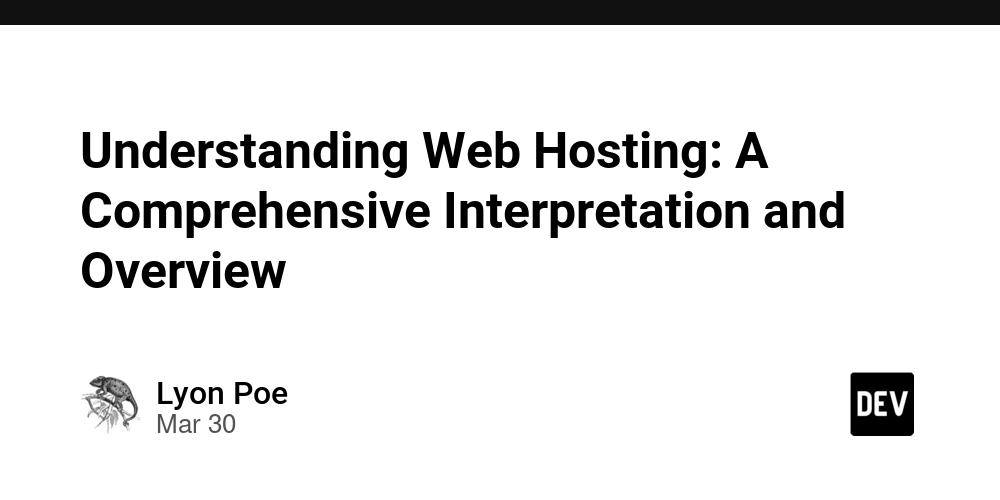Understanding Web Hosting: A Comprehensive Interpretation and Overview
Enterprises get complete control over system and software, can customize arrangement to satisfy business demands and partition the web server to host multiple domains. Due to the fact that resources are not shared, the demands of various other occupants do not influence service and protection. This exclusivity additionally allows IT teams to fix problems faster. Think about a web hosting service provider as a monitoring company that oversees web pages and provides various hosting rates that provide different degrees of service. Different kinds of web hosting systems are readily available, consisting of totally free web hosting alternatives. PHP, Python, Java, Perl and Ruby are 5 prominent shows languages that are sustained by web hosting. Django (Python), Ruby on Rails (Ruby structure) ASP.NET and, Laravel (PHP) are 4 popular frameworks sustained by web hosting. Some web hosts support a huge extent of these languages and structures yet the most crucial thing to examine is that it supports the specific programs languages you prepare to make use of. Linux and Windows are 2 operating systems with different staminas and application assistance. Linux is an open-source system that is much more preferred as a result of its affordability, compatibility and security. Windows is an OS developed by Microsoft and subject to licensing charges. Web Hosting Define Heavy players like Google consider web page tons time when they're choosing which websites to show in those treasured top search results. Yet do not stop at simply uptime percents; your hosting service provider must additionally proactively keep track of traffic and server performance. The goal is to prepare for and resolve any type of problems prior to they can cause problems. The main benefit of devoted holding hinge on its overall control. You have the liberty to configure the web server any type of way you want, from its operating system to safety and security protocols. When you develop an account with your web hosting company, your provider designates some area for your website or internet application on its server. You can access and manage this room from your holding account dashboard. You will certainly likewise get accessibility to other sources, such as random gain access to memory ( RAM), main handling unit ( CPU), and data transfer. Interpretation of Web Hosting Web hosting is a service that enables individuals and organizations to make their web sites accessible online. It entails saving internet site documents on a web server, which is connected to the web, enabling customers to view the material through internet browsers. Web hosting comes in various types, consisting of shared, committed, and cloud holding, each offering various degrees of performance, security, and source allocation to fulfill diverse requirements. Comprehending web hosting is crucial for any individual wanting to establish a solid on-line existence. General Principle Web hosting refers to the solution that enables people and organizations to make their websites available on the web. It includes storing website data and data on web servers, which are effective computer systems made to take care of and serve these resources to individuals worldwide. When a customer kinds an internet address right into their browser, the demand is sent to the webhosting's web server, which then provides the web site's material to the user's tool. Basically, web hosting acts as the foundation for a web site's presence online. Without hosting, an internet site would not have the ability to work or be accessed by individuals. Various kinds of web hosting solutions exist, consisting of shared, VPS, dedicated, and cloud organizing, each catering to various requirements and demands relying on elements such as website traffic, storage, and performance. Choosing the right web hosting provider is critical for guaranteeing web site speed, reliability, and safety and security. Aspects to think about include web server uptime, customer assistance, data transfer limits, and scalability alternatives. Overall, web hosting is a crucial component of the online ecosystem, making it possible for companies, musicians, and people to share their material with a worldwide target market. Importance in Site Performance Web hosting describes the service that enables people and organizations to publish their websites online. Basically, it entails leasing server area from a holding service provider, where all the documents, databases, and material of a web site are kept. This service makes certain that the internet site comes to individuals internationally through the Web. The relevance of web hosting in internet site performance can not be overstated. A trustworthy web hosting service warranties that a website is consistently available to its customers, guarantees smooth efficiency, and offers the needed rate for loading web pages. With quality hosting, web sites can manage traffic changes without

Enterprises get complete control over system and software, can customize arrangement to satisfy business demands and partition the web server to host multiple domains. Due to the fact that resources are not shared, the demands of various other occupants do not influence service and protection. This exclusivity additionally allows IT teams to fix problems faster. Think about a web hosting service provider as a monitoring company that oversees web pages and provides various hosting rates that provide different degrees of service. Different kinds of web hosting systems are readily available, consisting of totally free web hosting alternatives.
PHP, Python, Java, Perl and Ruby are 5 prominent shows languages that are sustained by web hosting. Django (Python), Ruby on Rails (Ruby structure) ASP.NET and, Laravel (PHP) are 4 popular frameworks sustained by web hosting. Some web hosts support a huge extent of these languages and structures yet the most crucial thing to examine is that it supports the specific programs languages you prepare to make use of. Linux and Windows are 2 operating systems with different staminas and application assistance. Linux is an open-source system that is much more preferred as a result of its affordability, compatibility and security. Windows is an OS developed by Microsoft and subject to licensing charges.
Web Hosting Define
Heavy players like Google consider web page tons time when they're choosing which websites to show in those treasured top search results. Yet do not stop at simply uptime percents; your hosting service provider must additionally proactively keep track of traffic and server performance. The goal is to prepare for and resolve any type of problems prior to they can cause problems. The main benefit of devoted holding hinge on its overall control. You have the liberty to configure the web server any type of way you want, from its operating system to safety and security protocols.
When you develop an account with your web hosting company, your provider designates some area for your website or internet application on its server. You can access and manage this room from your holding account dashboard. You will certainly likewise get accessibility to other sources, such as random gain access to memory ( RAM), main handling unit ( CPU), and data transfer.
Interpretation of Web Hosting
Web hosting is a service that enables individuals and organizations to make their web sites accessible online. It entails saving internet site documents on a web server, which is connected to the web, enabling customers to view the material through internet browsers. Web hosting comes in various types, consisting of shared, committed, and cloud holding, each offering various degrees of performance, security, and source allocation to fulfill diverse requirements. Comprehending web hosting is crucial for any individual wanting to establish a solid on-line existence.
General Principle
Web hosting refers to the solution that enables people and organizations to make their websites available on the web. It includes storing website data and data on web servers, which are effective computer systems made to take care of and serve these resources to individuals worldwide. When a customer kinds an internet address right into their browser, the demand is sent to the webhosting's web server, which then provides the web site's material to the user's tool.
Basically, web hosting acts as the foundation for a web site's presence online. Without hosting, an internet site would not have the ability to work or be accessed by individuals. Various kinds of web hosting solutions exist, consisting of shared, VPS, dedicated, and cloud organizing, each catering to various requirements and demands relying on elements such as website traffic, storage, and performance.
Choosing the right web hosting provider is critical for guaranteeing web site speed, reliability, and safety and security. Aspects to think about include web server uptime, customer assistance, data transfer limits, and scalability alternatives. Overall, web hosting is a crucial component of the online ecosystem, making it possible for companies, musicians, and people to share their material with a worldwide target market.
Importance in Site Performance
Web hosting describes the service that enables people and organizations to publish their websites online. Basically, it entails leasing server area from a holding service provider, where all the documents, databases, and material of a web site are kept. This service makes certain that the internet site comes to individuals internationally through the Web.
The relevance of web hosting in internet site performance can not be overstated. A trustworthy web hosting service warranties that a website is consistently available to its customers, guarantees smooth efficiency, and offers the needed rate for loading web pages. With quality hosting, web sites can manage traffic changes without crashing, hence improving customer experience. Moreover, excellent web hosting typically includes attributes such as technological assistance, protection actions, and regular backups, which contribute to the general stability and security of a site.
In summary, web hosting is a vital component of any kind of online existence, as it directly influences how well a site runs, exactly how quickly it loads, and how secure it remains. Selecting a respectable hosting provider is crucial for anyone seeking to build an effective online platform.
Types of Web Hosting
Web hosting is a basic solution that makes it possible for individuals and organizations to make their internet sites available on the web. With various types of web hosting readily available, such as shared, VPS, dedicated, and cloud holding, users can select the alternative that best fits their needs in terms of performance, scalability, and cost. Each type uses unique functions and advantages, satisfying a variety of internet site needs and technological competence.
Shared Holding
Web hosting is a solution that allows individuals and organizations to make their sites obtainable on the internet. Among the different sorts of web hosting offered, shared holding is one of the most popular choices, specifically for novices and local business. Shared hosting entails several internet sites being hosted on a solitary server, sharing its resources such as data transfer, storage, and handling power.
Here are some essential features of common holding:
Economical: Shared organizing strategies are generally a lot more budget-friendly than various other holding kinds, making them an attractive option for those with spending plan restrictions.
Easy to use: Numerous common holding suppliers provide easy-to-use control board and one-click installations, simplifying the site setup procedure for non-technical individuals.
Limited Resources: Since numerous internet sites share the same server, resources like CPU and memory are restricted, which can affect efficiency if one site experiences high web traffic.
Fundamental Safety and security: While shared holding offers some protection procedures, it might not be as durable as specialized holding solutions, as susceptabilities in one website can possibly affect others on the very same web server.
Scalability: Shared hosting can be an excellent starting point, but as an internet site grows, individuals may find they need to update to a much more durable holding option to fit enhanced web traffic and performance needs.
Overall, shared organizing is an outstanding choice for people and local business seeking to develop an online visibility without significant costs or technical expertise.
VPS Hosting
Web hosting is a solution that allows individuals and organizations to make their websites available on the internet. There are different kinds of web hosting readily available, each dealing with different requirements, varying from little personal blog sites to big e-commerce websites. Recognizing these kinds can aid users select the most ideal organizing option for their particular requirements.
One preferred form of web hosting is Virtual Private Server (VPS) holding. VPS organizing supplies a middle-ground service in between shared and specialized organizing. In a VPS setting, several individuals share a physical server, however each customer has their very own devoted portion of sources, including CPU, RAM, and disk area. This arrangement enables far better performance and raised control contrasted to shared organizing, where resources are merged amongst all users.
VPS holding is optimal for companies that require more power and versatility than what shared holding deals, without the high prices associated with dedicated holding. It permits individuals to mount their own software program, take care of customized applications, and configure server setups according to their requirements. This makes it an appropriate alternative for growing internet sites or applications that anticipate greater traffic and require reliable uptime.
Overall, VPS organizing is an outstanding option for those who need more than standard holding solutions while still being budget-conscious. By understanding the nuances of web hosting types, customers can make informed choices to sustain their on the internet presence efficiently.
Committed Holding
Web hosting is a service that permits individuals and companies to make their sites obtainable online. It entails storing the site's data on a web server, which is linked to a high-speed net link. Among the numerous types of web hosting available, specialized organizing is a noticeable choice for organizations that call for greater control, efficiency, and safety and security.
Devoted organizing is a kind of web hosting where an entire web server is designated to a single client. This suggests that the customer has complete control over the server's resources, consisting of CPU, RAM, and storage space, which can be tailored to satisfy certain needs. This is especially beneficial for huge services or high-traffic web sites that need reliable efficiency and greater uptime.
Among the considerable advantages of committed organizing is boosted safety and security. Since the web server is not shared with other users, sensitive information is much less susceptible to violations or strikes. This makes it an ideal option for e-commerce web sites or any type of organization that handles confidential information.
In addition, devoted holding allows for better customization and adaptability. Individuals can set up any software application or applications they call for and set up the web server setups to maximize efficiency. This degree of customization is not feasible with common hosting or other sorts of hosting, where sources are split amongst multiple users.
While specialized hosting often tends to be more expensive than shared or VPS organizing choices, the benefits it offers in regards to efficiency, security, and control typically justify the investment for businesses wanting to establish a solid online existence.
Cloud Hosting
Web hosting is a solution that enables individuals and companies to make their websites available on the internet. It includes saving the site's files on servers, which are connected to the web. There are different kinds of web hosting readily available, each catering to different demands and use instances. One of one of the most preferred kinds is cloud holding.
Cloud organizing uses multiple web servers to host websites, which implies sources can be designated dynamically based upon demand. This makes sure high accessibility and integrity, as web sites can seamlessly change to another server in case of equipment failure. Cloud organizing is specifically advantageous for services that experience rising and falling degrees of traffic, as it uses scalability without the need for substantial ahead of time investment in hardware.
Moreover, cloud hosting typically gives improved performance owing to the distributed nature of its facilities. It can deal with sudden spikes in traffic better than conventional organizing methods. In addition, safety measures are often a lot more robust because of the redundancy and backup options offered across multiple servers.
In summary, cloud hosting exhibits a contemporary approach to web hosting, giving versatility, scalability, and dependability, making it a preferred selection for many people and businesses today.
Managed Hosting
Web hosting describes the service that enables people and organizations to make their web site easily accessible on the web. It involves storing website documents on servers that are attached to the net, allowing users to accessibility these websites via internet browsers. There are various sorts of web hosting, each serving different demands and preferences. One popular option is handled organizing, which uses a higher degree of assistance and management for users.
Handled organizing is created to eliminate users from the technical intricacies of web hosting. Here are some crucial features of taken care of hosting:
Total web server administration, including arrangement, maintenance, and updates.
24/7 technological assistance to solve problems promptly.
Enhanced safety and security procedures to protect websites from risks.
Automatic backups to avoid information loss.
Optimized performance and reliable uptime assurances.
Picking managed hosting can be a valuable choice for those who like to focus on their service instead of the technological aspects of web hosting.
Components of Web Hosting
Web hosting is an important aspect of producing and maintaining an on-line presence, as it includes the storage and distribution of website data to individuals online. Numerous key components contribute to web hosting solutions, including server equipment, software application, storage space services, transmission capacity, and security attributes. Each of these elements plays a vital role in making certain that internet sites come, useful, and safe, dealing with the varied requirements of organizations and individuals alike. Comprehending these parts is vital for anyone wanting to establish or improve their online platform.
Web servers
Web hosting is a crucial solution that allows individuals and companies to make their internet sites easily accessible on the internet. One of the basic components of web hosting is servers, which are effective computers developed to store, process, and provide web site web content to individuals. Web servers can vary in type relying on the requirements of the hosting setting.
Devoted servers offer exclusive resources to a solitary customer or organization, offering improved performance and full control over web server settings. In contrast, shared servers host numerous sites on a solitary web server, making it a much more cost-effective service, though it can result in slower efficiency if sources are excessive used.
Online Exclusive Servers (VPS) are a crossbreed choice that combines facets of both dedicated and common hosting. They dividing a physical server right into numerous digital web servers, offering individuals with committed sources while still enabling cost sharing. This arrangement is ideal for growing internet sites that require even more power than shared holding can offer but do not yet require a full specialized server.
Cloud holding is one more cutting-edge strategy that leverages several interconnected web servers to host websites. This flexible service permits sites to scale conveniently and can offer better uptime and integrity since sources can be drawn from various web servers in situation of failings.
In addition to these kinds, the underlying facilities and technology made use of by these servers, such as operating systems and web server software program, are also integral components. Correct setup and management of these servers make sure sites lots quickly and operate efficiently, inevitably giving customers with a positive experience.
Information Centers
Web hosting is a solution that permits people and companies to make their web sites easily accessible online. It involves several elements that interact to make certain that web sites are readily available to individuals worldwide. Recognizing these components and the function of information facilities is vital for any individual looking to develop an on the internet visibility.
Servers: The physical machines that keep web site data and supply it to users' browsers upon demand.
Storage space: High-capacity storage space systems that hold site data, data sources, and media material.
Transmission capacity: The amount of data transferred over the internet, which influences website loading speeds and accessibility.
Domain Name System (DNS): A system that equates domain names right into IP addresses, allowing users to get to sites quickly.
Data Centers: Facilities that home web servers and their linked elements, providing safety and security, power, and cooling systems to support continual operation.
Back-up Solutions: Equipment to create and save backups of web site information, guaranteeing recovery in situation of data loss.
Consumer Assistance: Technical aid for troubleshooting concerns and preserving the internet site's performance.
Information facilities play a critical duty in web hosting by giving the facilities required to run web servers successfully. They are geared up with advanced technology and redundancy steps to make certain reliability and high performance. Elements such as location, security, and scalability of information facilities can significantly affect the hosting experience and general website efficiency.
Data transfer and Storage space
Web hosting is a crucial solution that permits individuals and companies to make their web sites obtainable on the internet. It involves storing site data on servers, which deliver them to customers' browsers when they enter a domain name. Comprehending the parts of web hosting is necessary for anybody looking to establish a presence online.
One key element of web hosting is data transfer. Data transfer describes the quantity of information that can be transferred from the server to the individual's device within a certain timespan, normally gauged in megabits per second (Mbps). Greater transmission capacity allows for faster loading times and the capacity to deal with even more simultaneous site visitors to a website. This is vital for websites with high website traffic, such as shopping systems or information sites, where efficiency and rate influence customer experience.
Storage is another essential facet of web hosting. It concerns the quantity of disk room alloted for storing site data, including HTML files, photos, videos, and databases. The called for storage area can differ substantially based on the nature of the web site; simple blog sites might only need a couple of gigabytes, while big e-commerce websites might need numerous gigabytes and even terabytes. Appropriate storage space guarantees that all material is conveniently accessible and that the internet site runs smoothly.
In recap, both transmission capacity and storage space are essential parts of web hosting that straight impact a site's efficiency. Picking the appropriate hosting strategy that includes sufficient data transfer and storage capability is essential for producing a successful and effective on-line presence.
Domain
Web hosting is a solution that enables people and companies to make their internet sites obtainable on the web. It includes storing website files on servers and offering the needed modern technologies and solutions to keep them running efficiently. Crucial parts of web hosting include the server, where documents are stored, bandwidth for data transfer, and storage space for internet site data. Additionally, domain are crucial as they function as the address through which individuals access sites. Here's a closer consider the crucial components:
Web server: A powerful computer system that shops site data and makes them available to individuals online.
Data transfer: The quantity of information that can be transferred over a web link, affecting website loading rate and gain access to.
Storage space Space: The amount of disk space alloted to an internet site for saving data, databases, and various other data.
Domain: The distinct address made use of to access an internet site, such as www.example.com.
Email Accounts: Numerous holding solutions give e-mail accounts connected with the domain, improving expertise.
Safety and security Functions: Provider including SSL certifications, firewall programs, and backups that secure internet sites from threats.
Technical Assistance: Aid supplied by hosting companies for troubleshooting and preserving internet site efficiency.
Web Hosting Providers
Web hosting service providers play a vital role in the on-line landscape, using the infrastructure and solutions essential for individuals and services to release their web sites on the net. By leasing server space and offering connection, these carriers allow users to store their web site data, handle domain name registrations, and ensure that their web content is accessible to individuals worldwide. With a selection of hosting alternatives available, from shared and VPS to dedicated and cloud hosting, possible internet site owners can locate a solution customized to their certain requirements and budget.
Top Global Companies
Web hosting is a solution that permits individuals and companies to make their web sites obtainable online. It includes renting or acquiring area on a web server where all the data, databases, and web content of a site are stored. A reputable web hosting carrier guarantees that your website is online, quick, and reachable in any way times.
A few of the top global web hosting suppliers include firms like Bluehost, SiteGround, HostGator, and DreamHost. These carriers use a range of organizing plans that cater to various needs, such as common organizing, VPS hosting, and committed servers. Attributes often consist of 24/7 client assistance, free domain name registration, and enhanced safety actions.
Bluehost is significant for its strong performance and WordPress combination, making it a prominent option amongst bloggers and small companies. SiteGround stands apart for its phenomenal client service and superior uptime reliability, while HostGator is recognized for its versatile pricing and user friendly control board. DreamHost, on the various other hand, is identified for its dedication to privacy and transparency, providing a 97-day money-back assurance.
The appropriate web hosting provider plays an important duty in the success of a website, impacting every little thing from filling times to search engine optimization positions. Whether you're releasing a personal blog site or a huge ecommerce website, picking the ideal provider is important for a smooth on the internet experience.
Attributes to Consider
When selecting a web hosting provider, it's vital to think about a number of vital attributes that can impact your site's performance and your overall individual experience. The best web hosting solution can improve your site's speed, protection, and dependability, making it obtainable to a more comprehensive target market.
Among one of the most vital attributes is uptime reliability. Search for providers that assure a 99.9% uptime, guaranteeing your web site is offered to site visitors in all times. Additionally, think about the sort of organizing plans used, such as shared, VPS, dedicated, or cloud organizing, depending on your web site's demands and website traffic assumptions.
Another important element is customer assistance. A holding provider needs to supply 24/7 support via various networks, consisting of real-time conversation, e-mail, and phone, to assist you immediately with any technical concerns or inquiries.
Security functions likewise play an essential function in web hosting. Make certain the company provides SSL certificates, routine backups, and malware security to guard your web site from prospective risks.
Additionally, check out the scalability options provided. As your web site grows, you may require to upgrade your holding plan. Pick a supplier that allows for simple scaling without significant downtime or problem.
Last but not least, think about pricing and agreement terms. While it's tempting to select the cheapest choice, guarantee you balance expense with the features supplied. Search for transparent prices without concealed fees and read the fine print concerning renewal prices and agreement sizes.
Prices Designs
Web hosting refers to the service that permits individuals and companies to publish their websites onto the Web. A web hosting service provider provides the necessary technologies and solutions needed for the web site to be viewed on the internet. This can consist of storage room on servers, bandwidth for data transfer, and software assistance, to name a few features.
There are different rates versions supplied by web hosting providers, each tailored to different needs. Shared hosting is just one of the most usual and economical alternatives, where multiple web sites share the very same web server sources. This design is optimal for personal websites or local business yet may have restrictions in terms of performance and scalability.
Digital Exclusive Server (VPS) organizing supplies an equilibrium in between common holding and devoted servers. VPS individuals still share a web server but have actually devoted resources, allowing for better performance and control at a modest cost factor. This option is suitable for companies needing even more power without fully committing to specialized hosting.
Committed hosting is a costs choice that gives a whole server exclusively for one client. This version provides optimal performance, modification, and safety, making it appropriate for large enterprises or high-traffic sites, yet it comes at a greater price.
Cloud holding has actually gotten popularity due to its flexible rates model based upon source use. It utilizes a network of virtual web servers to disperse traffic and equilibrium workloads, permitting websites to range effectively. This is perfect for businesses experiencing variable website traffic degrees.
Lastly, took care of hosting packages provide extra services, consisting of web server maintenance, efficiency surveillance, and security updates. These packages can be much more expensive however eliminate the consumer of technological obligations, making them a preferred choice for those that want to focus on their core service as opposed to IT management.
Picking the Right Web Hosting Solution
Picking the appropriate web hosting service is a vital choice for any person looking to establish an existence online. With a huge selection of options offered, from shared organizing to specialized web servers, recognizing the details demands of your internet site is necessary. Variables such as efficiency, integrity, consumer assistance, and cost play a significant role in establishing the most effective web hosting option. By assessing these elements carefully, you can guarantee that your site runs efficiently and efficiently, eventually contributing to your on the internet success.
Analyzing Needs
Picking the best web hosting solution is a crucial step in establishing an on-line presence. With a range of choices readily available, it is essential to examine your specific demands before choosing. Understanding the nature of your website, its traffic needs, and your budget plan will certainly direct you in selecting the most appropriate holding service.
Firstly, identify the sort of site you are intending to produce. If it's an individual blog site, a common organizing strategy may be enough. Nonetheless, for a business site anticipating high website traffic, a much more robust solution like devoted or cloud organizing might be needed. Evaluate your current requirements and anticipate future growth to prevent prospective problems later on.
Next off, consider the technological assistance offered by different hosting carriers. Trustworthy client assistance is important, specifically if you experience technological troubles. Search for services that provide 24/7 support with numerous channels such as online chat, phone, or email.
Furthermore, take into consideration the attributes consisted of in each organizing plan. Look for aspects like site home builders, scalability options, and security steps. It's also helpful to analyze the server uptime guarantees of the holding solution, as this influences your internet site's availability to visitors.
Finally, compare costs amongst different web hosting solutions, keeping an eye out for surprise costs or revival rates. Pick a plan that fits within your budget plan while still fulfilling your technological and support demands. By very carefully analyzing your needs and the available options, you can make a notified choice and set your web site up for success.
Performance Metrics
Picking the ideal web hosting solution is an essential step for anyone aiming to develop an existence online. It includes assessing different factors, including efficiency metrics, that can significantly influence the performance and user experience of a web site. Efficiency metrics are essential in figuring out how well a hosting solution can sustain your website's requirements, making sure that it remains obtainable and responsive to customers.
When examining web hosting solutions, a number of vital efficiency metrics need to be taken into consideration. Among the key metrics is uptime, which describes the percent of time that a web host's servers are functional and obtainable. A reliable organizing solution must go for at least 99.9% uptime, decreasing the threat of your web site being down during optimal traffic times.
One more vital metric is lots time, which gauges just how quickly a websites loads for site visitors. Research shows that even a one-second delay in filling time can lead to significant decrease in individual interaction and conversion rates. Consequently, picking a host that provides quick loading times is vital for retaining visitors and enhancing search engine positions.
In addition, transmission capacity and storage capability are crucial factors to consider. Transmission capacity establishes just how much data can be transferred to and from your site within a provided time frame, impacting just how well your website does under rush hour problems. Adequate storage ensures that you have enough room for your documents, data sources, and backups without compromising speed or performance.
Lastly, scalability is a statistics that can not be neglected. As your internet site expands, your organizing demands might change. An excellent organizing carrier must supply versatile strategies that permit you to conveniently upgrade or readjust sources without considerable downtime or disturbance.
To conclude, choosing the best web hosting service needs careful consideration of different performance metrics. By focusing on uptime, load time, transmission capacity, storage ability, and scalability, you can make sure that your web site supplies a rapid and trustworthy experience for your visitors, eventually contributing to your online success.
Customer Assistance
Choosing the ideal web hosting solution is an important step in developing an on the internet existence. One of the essential elements to think about during this option procedure is the top quality of client support supplied by the hosting provider. Reputable consumer assistance can significantly improve the overall user experience, making sure that any type of technical concerns or questions are immediately addressed.
When examining customer support in web hosting, think about the complying with aspects:
Availability: Examine if the assistance group is available 24/7, as this is crucial for solving problems at any time.
Call Methods: Seek multiple contact options, including real-time chat, e-mail, and phone support, so you can choose the most hassle-free technique for connecting.
Feedback Time: Research the ordinary response time of the assistance team. Quick actions can reduce downtime and improve the performance of your site.
Knowledge Base: A well-organized knowledge base or FAQ area can supply instant support, enabling individuals to locate responses individually prior to reaching out to support.
Consumer Testimonials: Read consumer evaluations and endorsements to determine real-world experiences related to the support given by the holding service.
Technical Knowledge: Guarantee that the support staff is educated and trained to handle a range of hosting-related problems.
Choosing a hosting solution with durable consumer assistance can save money and time in the long run, making it important for preserving a successful online system.
Future Patterns in Web Hosting
The landscape of web hosting is constantly progressing, driven by innovations in technology and altering individual demands. As services and individuals alike progressively count on online systems, comprehending future patterns in web hosting ends up being necessary. Developments such as cloud hosting, expert system, and improved security actions are readied to redefine how web sites are hosted and taken care of. This short article explores the vital growths imminent that guarantee to form the future of web hosting, guaranteeing a much more reliable and obtainable online experience for all.
Enhanced Use Cloud Solutions
The landscape of web hosting is progressing quickly, driven by technological advancements and changing user demands. One of the most considerable trends is the boosted use of cloud solutions, which use an even more flexible, scalable, and affordable method to organizing.
Cloud hosting permits organizations to leverage a network of remote servers to keep and manage their data. This change from conventional holding approaches to cloud remedies allows organizations to quickly scale their sources up or down based on their needs, ensuring that they only pay for what they utilize. The flexible nature of cloud computer draws in organizations of all sizes, as it minimizes the threat of over-provisioning or under-utilization.
Additionally, cloud hosting boosts dependability. With data distributed across numerous web servers, the risk of downtime is considerably reduced. In the event of a web server failing, website traffic can be rerouted perfectly to an additional web server, maintaining the internet site's availability. This level of redundancy is crucial for organizations that rely on their online existence.
Another important trend is the expanding emphasis on security and conformity within cloud atmospheres. As data breaches become extra usual and regulations tighten, shadow service providers are investing greatly in sophisticated protection methods and compliance certifications. This focus not only safeguards companies but also constructs trust fund among customers who are increasingly worried concerning data privacy.
Additionally, the surge of crossbreed cloud remedies is improving the holding landscape. Organizations are starting to incorporate public and exclusive cloud solutions to enhance their work. This hybrid technique allows organizations to appreciate the advantages of both atmospheres, stabilizing adaptability with the need for enhanced control over delicate data.
As even more businesses move their operations to the cloud, web hosting providers are adapting by offering customized cloud solutions. These include managed cloud solutions, where carriers manage the intricacy of cloud administration, permitting companies to concentrate on their core procedures while appreciating the benefits of cloud computing.
In conclusion, the future of web hosting is progressively linked with cloud services. The shift towards more versatile, secure, and scalable hosting models is positioned to redefine how organizations handle their online existence, leading the way for innovation and growth in the electronic landscape.
Concentrate on Security
The progressing landscape of web hosting is significantly affected by the requirement for durable safety steps. As cyber threats become a lot more sophisticated, the focus on protection has actually transitioned from being a simple add-on to an essential requirement in web hosting solutions. best web hosting south africa indicate an emphasis on multi-layered safety and security protocols designed to secure internet sites and their data.
One considerable pattern is the integration of expert system (AI) and machine learning (ML) into safety structures. These technologies can help detect unusual patterns and flag prospective dangers in real-time, minimizing reaction times and preventing breaches prior to they rise.
An additional essential development is the growing adoption of cloud hosting. While offering scalability and adaptability, cloud hosting additionally permits far better data redundancy and backup services. Suppliers are increasingly concentrating on securing cloud facilities with sophisticated encryption approaches and strict gain access to controls to make sure information integrity.
In addition, as compliance with regulations like GDPR and CCPA comes to be vital, web hosting service providers are improving their safety features to satisfy these criteria. This includes not only shielding customer information but additionally ensuring that holding atmospheres are certified with numerous lawful frameworks to prevent substantial fines and legal repercussions.
Furthermore, the surge of zero-trust safety models highlights the requirement for continual confirmation and tracking of user gain access to. Future web hosting services will likely implement even more granular accessibility controls and normal audits to strengthen the safety position of hosted applications.
Finally, consumer education and learning and recognition are ending up being integral components of safety and security in web hosting. As individuals become more notified regarding the dangers related to inadequate security methods, hosting companies are expected to use thorough guides and support to assist consumers carry out ideal techniques for securing their sites.
In conclusion, the future of web hosting is totally linked to enhanced security procedures, driven by technological innovations and the developing danger landscape. Service providers who prioritize these aspects will not just secure their customers but additionally develop an one-upmanship in the saturated market.
Environmental Considerations
The future of web hosting is swiftly developing, not only in terms of technology yet additionally in response to growing ecological worries. As more services and consumers acknowledge the impact of digital tasks on the planet, sustainable techniques in web hosting are getting energy. These fads highlight the importance of effectiveness, renewable energy resources, and eco-friendly modern technologies in the hosting industry.
One significant pattern is the change towards making use of renewable energy for information facilities. Numerous hosting carriers are currently dedicating to operate on 100% renewable resource, taking advantage of resources like solar, wind, and hydropower to minimize their carbon footprint. This shift is not only advantageous for the environment but also eye-catching to eco mindful customers that are seeking to straighten their values with their organizing selections.
One more essential factor to consider is energy effectiveness in equipment and infrastructure. As technology advancements, newer servers and equipment are developed to take in less energy while providing higher efficiency. This not only decreases functional expenses for hosting providers yet likewise minimizes the total ecological influence. Strategies such as virtualization and cloud organizing are additionally becoming progressively popular, permitting much better source allocation and decreased power waste.
Moreover, the increase of environment-friendly certifications and eco-labels is altering the landscape of web hosting services. Companies that embrace lasting practices can make certifications, giving assurance to clients regarding their commitment to ecological stewardship. This transparency promotes recognition and motivates customers to make enlightened choices concerning their organizing suppliers.
In general, the assimilation of environmental factors to consider right into web hosting reflects a broader shift towards sustainability in the tech industry. As awareness grows and technology evolves, it is likely that the need for environment-friendly organizing solutions will certainly continue to rise, shaping the future of web hosting in a much more environmentally friendly instructions.












































































